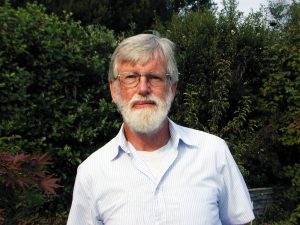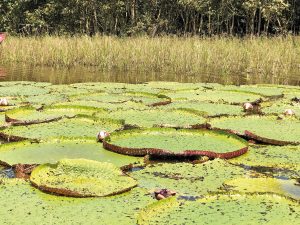March 2023
In the pod this month is botanist and ecologist Sir Ghillean Prance. We caught up with him ahead of his visit to Holy Trinity Bradpole on Sunday 5 March, when he will be speaking about the ‘Eco Church’ initiative.

The Bridge: You spent 30 years exploring and researching in the Amazon, including time spent living with indigenous tribespeople there. What can we in the Western ‘first world’ learn from the way these native people live?
Sir Ghillean Prance: It is very noticeable that where there is good intact forest in the Amazon, it’s where the indigenous peoples live. As a result, when studying the forest I tended to spend a lot of time in the territory of the native inhabitants. They have learned to manage sustainably the complicated ecosystems of the forest and the rivers. The wisdom of what we now call agroforestry – using multiple crops rather than monocultures – is one of the most important things for us to copy. They also share their resources equitably with the whole community rather than individuals becoming rich at the expense of others. I am a great admirer of these people but do not go along with the theory of the ‘noble savage’; they have their faults, such as intertribal fighting, but overall they know how to mange their environment and have many myths, taboos and legends that help them to respect nature.
TB: What is the single most important change that people in the UK can make to benefit or protect the environment?
GP: There are so many changes needed but one that would have a great effect is to live much more locally. Shop and eat from local resources that have not used a lot of fossil energy to reach you. Consider the food miles of what you eat. Above all, do something. Every small thing a person does mounts up when many others do the same thing. What you can do may seem small but it all adds up to a big help.
As a nation we must wean ourselves off the use of fossil fuels. We need to transfer to generating all our energy from renewable sources, because the single most dangerous thing to life on this planet is human-caused climate change.
TB: What would you say to people who suggest that scientific knowledge is incompatible with belief in a creator God?
GP: There are large number of scientists who are Christians. It is a falsehood that science and faith are incompatible. God revealed himself to us by two books, His creation and the Bible. When I study both carefully I find no barriers to belief, provided one does not take a too fundamentalist approach to the Bible. It is important to incorporate the findings of science into one’s faith and reconcile the two.
TB: You’re a former director of A Rocha, the organisation behind the Eco Church initiative. Aside from the obvious benefits to church land, what can church communities gain from getting involved with the scheme?
GP: There are now about 1,000 Eco Churches in the world. Each has had to examine and improve its environmental behaviour and this has to be good for the world. Eco Churches look for the best form of energy, avoid use of plastic, use less damaging detergents, etc etc. All this passes on to the individual members. Most importantly, the programme examines the daily behaviour of the congregation such as their means of transport, what they eat, the detergents they use to wash their clothes, and more. All this mounts up to a big contribution towards improving the environment around us.
As Christians we can feel good that we are actually doing something to take better care of God’s creation, to which the world has done so much damage. We have a special motive for environmental action and we can encourage all people around us to act on behalf of the environment.
TB: You were born in Suffolk and have lived and worked in New York and London as well as South America. How did you come to settle on the Jurassic Coast, where you now live?
GP: This was the result of a promise to my wife that when I retired we would live near the sea, which she loves so much. We started to look for a house and quickly found an ideal one in Lyme Regis in 1995. We have lived in it since 1999 and although officially ‘retired’ I have carried on with my botanical research and writing from here, producing 8 books, editing 4 more and contributing to 159 scientific papers and articles so far. We both greatly enjoy and feel privileged to live on the Jurassic Coast.
TB: Are you hopeful about the future of Earth and its people?
GP: A good question. I oscillate on this one according to the news I get of the world and its environment. Recent good news that tilted me towards optimism was the election of a president in Brazil who wants to stop the destruction of the Amazon rainforest. This is absolutely vital to prevent climate change getting out of control. My Christian faith greatly helps me to have some hope for the future.
TB: What is your favourite plant?
GP: The royal water lily, Victoria amazonica (pictured), a beautiful plant that I have studied in great detail, with its huge leaves and star-like flowers floating on the lakes of Amazonia.
www.arocha.org.uk/what-we-do/eco-church